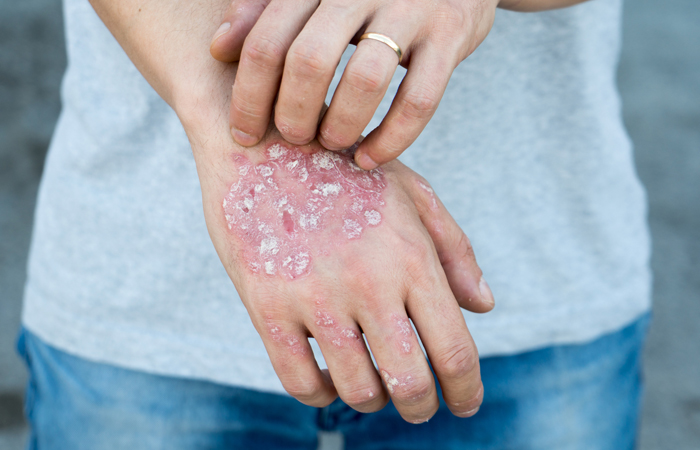Cold comfort
In Conditions
Follow this topic
Bookmark
Record learning outcomes
Winter weather can play havoc with skin. Make sure you’re prepared for your customers’ skin problems with this expert advice on how to solve the top winter skin dilemmas

Q: “I’ve had cold sores in the past and my lips are starting to feel tingly and are going red so I think I might have some coming again. Is there anything I can do to stop them or make them heal quickly?”
A: Cold sores are tiny blisters, usually round the mouth, caused by the herpes simplex virus. They usually begin with a tingling or burning sensation.
“It’s definitely best to try and treat cold sores as soon as you feel them coming on. Try applying an antiviral cream such as aciclovir to the affected area to avoid a full outbreak, as well as avoiding sunlight and abrasive skin treatments, which can act as triggers,” advises Dr Alexis Granite, consultant dermatologist at the Cadogan Clinic, London. “If you get frequent outbreaks or more resistant cold sores, prescription antiviral medication is also available from a doctor.”
Q: “My cheeks are particularly red at the minute. At first I thought I was just a bit warm and flushed but it hasn’t gone away and I’m starting to feel self conscious about it. What could it be and how do I treat it?”
A: This sounds like it might be rosacea, a common skin condition that affects one in 10 people, usually in middle age. It normally only affects the face and can look similar to acne, but the main noticeable difference is frequent flushing and redness together with small, lumpy red spots.
Strong sunlight is thought to be a main trigger for rosacea, as well as cold winds. “Around 30-50 per cent of people with rosacea are hypersensitive to sunlight as well as dry weather,” says consultant dermatologist Dr Nick Lowe at the Cranley Clinic and author of Perfectly Clear: the guide to clear skin. As such,
it is essential for sufferers to use a broad-spectrum sunscreen every day.
To treat rosacea, Dr Lowe says that there are low-dose antibiotics that can help with the flushing sufferers may experience, and there are various OTC creams that can reduce the redness. Ingredients in these include azeleic acid.
He also suggests advising sufferers to use a gentle cleanser: “Micellar water or gel are excellent,” says Dr Lowe.
Q: “I’ve been really cold recently, especially my feet, so I used a hot water bottle to warm them up but now they’re looking quite red and swollen and they’re very itchy. What’s wrong and can I do anything to stop the itching and irritation?”
A: “Fingers and toes that become very cold with itchy swollen areas when re-warming suggests a diagnosis of chilblains,” says Dr Sharon Wong, consultant dermatologist. “The cold weather causes the blood vessels in the digits to narrow, whilst re-warming causes blood in these vessels to leak into the skin resulting in swelling. Chilblains occur in those with poor circulation; it is worse in smokers and diabetics and in some people, it can be related to connective tissue disorders such as lupus. Chilblains can also be hereditary. It is important to keep fluctuations in temperature to a minimum by keeping your hands and feet warm with thick gloves and socks during the cooler months and ensure warm temperatures are maintained indoors.”
Dr Wong advises that customers see a doctor to confirm the diagnosis and run some basic blood tests to exclude other causes or contributory factors. Chilblains normally clear up without treatment in one to two weeks.
“In more severe cases, certain blood pressure medications, such as nifedipine, which widen the blood vessels can be prescribed to treat and also to prevent chilblains over the winter months.”
Q: “My eczema flares up in cold weather every year and I’m struggling to treat it effectively. What can you recommend and is there any way to prevent this happening every winter?”
A: The dry environment during winter damages the skin’s barrier layer – which in eczema sufferers is already more fragile – and skin becomes inflamed, cracked and sore. “Winter is a tough time for eczema patients as many [symptoms] will flare up in colder weather,” says Dr Granite, who advises sufferers keep their skin as hydrated as possible by using a mild cleanser and an emollient daily. Dr Granite adds: “A humidifier can help offset the drying effects of indoor heating. Avoid synthetic and wool fibres as these may aggravate inflamed skin. For eczema that does not respond to emollients alone, [sufferers should] consult with a healthcare professional as there are many prescription medications that can help.”
Other tips to pass on to customers include: swap long, hot baths for warm showers; use creams and washes designed for dry, eczema-prone skin; and turn the heating thermostat down to 18ºC as living in over-heated rooms can trigger a flare-up.
Q: “I’m going to the Alps on holiday in a couple of weeks and my friend has told me to remember to pack sun cream, but surely I don’t need it in December?”
A: “Yes, you definitely will need it,” says Dr Lowe. “When you’re at a high altitude, such as when skiing, the sunlight is more intense, even in December. This is because there is less atmosphere to filter out the UV rays. You can still burn on cloudy days in the mountains and ageing is an issue too because of high levels of UVA,” explains Dr Lowe. “I’d advise using at least SPF30 sunscreen every day, and pick one with maximum UVA protection too. When you’re in snow, the sunlight becomes even stronger as it gets reflected back onto your skin.”
Q: “I tend to get dry skin in winter, especially on my hands which become very sore. Is there anything I can do to prevent it happening and how should I treat any dry patches?”
A: Dr Granite advises customers with dry skin to: “Avoid using alcohol-based sanitizing gels on your hands as they can dry your skin out even further. Wear gloves for wet work of any kind as prolonged contact with water can dry your skin out.” Adding: “I keep a rich moisturising cream next to every sink in the house as well as in my bag and apply it after every time I wash my hands to keep them well hydrated. Wearing cotton gloves at night can also help emollients to penetrate your skin better. If dry patches seem very stubborn, then a prescription steroid cream may also help.”
Pharmacy staff can also advise customers to wear gloves outside whenever the weather is cold, as biting winds will make skin sore and chapped, and not to wait for hands to become dry – apply an emollient every day during winter to prevent it.
Q: “I have psoriasis and really struggle to keep it under control during the winter months. What advice can you offer me?”
A: Several changes happen during the winter that may contribute to flare-ups of psoriasis, explains Dr Wong. “Firstly, the use of central heating means the climate indoors is usually hot and dry. Those with dry skin conditions such as psoriasis need to apply moisturisers even more frequently than normal.” Dr Wong adds that customers may also wish to consider using a heavier petroleum-based emollient during the winter months. However, customers should avoid using these on their face if they are prone to breakouts.
Humectants such as glycerin and hyaluronic acid help to draw water molecules from the external environment to the skin’s surface, adding to their rehydrating properties. In addition, advise customers to: “Try to avoid washing in hot water – it’s best to shower in luke warm water. Use emollient or cream washes instead of products that lather or foam. The surfactants in foaming products strip away skin’s natural oils,” says Dr Wong.
With less sun exposure during winter, vitamin D levels naturally drop. “There is good evidence to support the role of maintaining a normal vitamin D level in improving psoriasis. Vitamin D levels should be checked in all psoriasis patients and if deficient, patients may be advised to take supplements and improve dietary intake of vitamin D-rich foods such as oily fish, cheese and fortified cereals. If the level of vitamin D is very low, prescription strength vitamin D may be required initially before reducing back to maintenance doses,” advises Dr Wong.
Flare-ups of psoriasis can be settled with prescription creams from a doctor. “These usually contain vitamin D, mild steroids and/or coal tar to calm down the inflammation and reduce scaling. In more widespread psoriasis a dermatologist may prescribe a course of UV treatment (phototherapy).”

Q: “My lips get chapped and sore as soon as the weather turns cold, and sometimes crack and bleed. What can I do to protect them and treat them if they become sore?”
A: Compared to the rest of our skin, the outer protective layer of cells called the stratum corneum is much thinner on your lips. “There are also no sebaceous glands in the skin of your lips. Both of these differences make lips prone to dehydration and chapping, particularly during winter from the effects of central heating and cold winds,” explains Dr Wong.
Lip balms containing petrolatum provide an effective barrier, protecting lips from the elements. “Choose plain products with minimal fragrance and colouring as dry, cracked lips are often sensitive and prone to further irritation. In addition to choosing the right product, it is important to reapply frequently throughout the day, and apply a thick layer just before bedtime,” advises Dr Wong.
Q: “My acne tends to get better in summer, and worse in the winter months. Why might this be and what can I do to keep it under control this winter?”
A: “Acne can get worse in winter for some people. Many of us get more depressed and stressed in winter, and these are triggers for flare-ups. Skin can become more sensitive in winter too, thanks to a drier atmosphere, so this might be another reason,” says Dr Lowe.
“If using a retin-A treatment to control acne, customers may want to use it a little less often in winter – perhaps every two to three nights instead of every night – if they find their skin is drying out more,” says Dr Lowe. “But if acne continues to worsen, despite correct use of the usual treatment, [customers should] see a GP about possible prescription treatments to help control it.”
Avoid synthetic and wool fibres as these may aggravate inflamed skin
